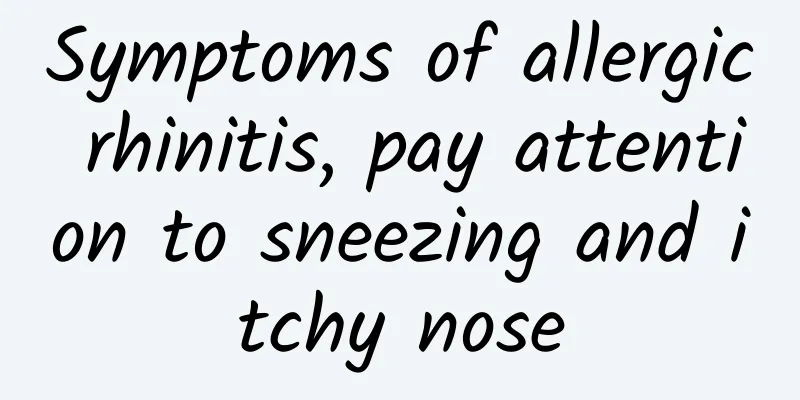Symptoms of allergic rhinitis, pay attention to sneezing and itchy nose

|
Allergic rhinitis is a very common type of rhinitis, with symptoms such as nasal itching, nasal congestion, and sneezing. Patients with allergic rhinitis should promptly learn about allergens and avoid contact, especially pollen allergies. Traditional Chinese medicine can be chosen to treat allergic rhinitis. 1. Common symptoms 1. Sneezing: Several times a day, more than 3 times each time, usually in the morning or at night or immediately after contact with allergens 2. Clear nasal discharge: A large amount of clear nasal discharge, which may sometimes drip from the nostrils unconsciously. 3. Nasal congestion: intermittent or continuous, unilateral or bilateral, with varying degrees of severity. 4. Itchy nose: Most patients experience itching in the nose, and patients with hay fever may also experience itchy eyes, ears, and throat. 2. TCM treatment of allergic rhinitis: 1. Lung Qi deficiency and coldness, weak defense surface [Main symptoms] Paroxysmal nasal congestion, itchy nose, frequent sneezing, clear watery nasal discharge, decreased sense of smell, more likely to occur in the morning and evening, fear of wind and cold, flare-ups when exposed to wind (cold), easy to catch a cold; shortness of breath, laziness to speak, low and timid voice, spontaneous sweating, pale complexion, cough with thin sputum or weak cough and wheezing. Pale tongue, thin white coating, Thin and weak. Examination showed that the inferior turbinate was enlarged and smooth, the nasal mucosa was pale or grayish white and edematous, and watery secretions were visible in the nasal passages. [Treatment method] Nourish the lung qi, consolidate the exterior and protect the body, warm the lungs and dispel cold. [Prescription] For patients with qi deficiency, choose: Yupingfeng Powder with modifications: Saposhnikovia divaricata, Astragalus membranaceus (roasted with honey), and Atractylodes macrocephala. If the nose itches like ants crawling, add silkworm pupae and cicada shells; if sneezing, clear nasal discharge, and low voice, add ginseng, poria, and yam; if the waist and knees are sore, add wolfberry, Processed Polygonum multiflorum; if the patient is afraid of wind and cold, and has clear runny nose, you may add cinnamon twigs, dried ginger, jujube, etc. Or you can combine Yupingfeng Powder with Xanthium sibiricum and add the following ingredients: Astragalus, Atractylodes, Saposhnikovia, Schizonepeta, Xanthium sibiricum, Magnolia, Angelica dahurica, Asarum, Menthus, Forsythia, Fructus Douchi, Roasted Licorice, and Ginger. For patients with deficiency and cold, choose: Wenfei Guizhi Decoction (Yichun Shengyi, Volume 4): cinnamon twig, angelica, poria, agarwood, perilla seed, tangerine peel, pinellia, trichosanthes fruit, mulberry bark. 2. Weak spleen and insufficient transformation [Main symptoms] Severe nasal congestion and distension, thin and clear nasal discharge, blocked and dripping nasal discharge, and dull sense of smell. Nasal congestion, itchy nose, continuous clear discharge, sudden sneezing, pale complexion, weight loss, poor appetite, abdominal distension and loose stools, fatigue and weakness in the limbs, shortness of breath and laziness to speak, pale and fat tongue with teeth marks on the edges , the tongue coating is thin, white or greasy, and the pulse is thready, weak and powerless. Examination showed that the inferior turbinate was enlarged and smooth, the mucosa was pale or grayish white, and there was watery secretion. (Allergic rhinitis in children often manifests as deficiency of the lung and spleen) [Treatment method] Tonify Qi and strengthen the spleen, warm and move the middle Yang. [Prescription] You can choose Buzhong Yiqi Decoction from the "Discussion on the Spleen and Stomach". 【Composition】Astragalus, ginseng, white atractylodes, licorice, angelica, tangerine peel, cimicifuga, bupleurum, ginger, jujube. If the patient has abdominal distension, loose stools, clear runny nose, and dripping, add yam, dried ginger, and amomum villosum. If the patient is afraid of wind and cold and sneezes frequently when exposed to cold, add saposhnikovia divaricata, cassia twig, etc. If the limbs are not warm, the patient is afraid of cold and has back pain, cinnamon, aconite and wolfberry can be added as appropriate. |
<<: What is the use of Xanthium sibiricum in treating rhinitis?
>>: What are the effects of wormwood essential oil
Recommend
Can fat particles under the eyelids be removed?
It is also common to have fat particles on the lo...
How to do a self-enema
First of all, you should know that enema is a the...
What ointment to use for blistering eczema
Nowadays, more and more people are suffering from...
How do people who often get angry treat it?
"Getting angry" is actually a term in T...
What are the benefits of neck scraping?
Now we all know that if adults feel unwell, they ...
What are the effects and functions of wild Codonopsis pilosula
Codonopsis is a traditional Chinese medicine. Man...
What causes back pain?
Young people nowadays are very lacking in exercis...
I suddenly wet the bed once in my twenties
It is very unexpected for adults to suddenly wet ...
Can I use heat to treat my lumbar disc herniation?
Lumbar disc herniation has become an increasingly...
1 bath method to make your liver healthier
It is said that taking a bath can also be good fo...
What happens if you don't fill your lost teeth?
The importance of teeth is self-evident, but in d...
What is the best way to eat papaya to enlarge breasts?
Speaking of papaya, everyone knows that it can he...
What causes a neurological infection?
Nerve infection is extremely harmful to human hea...
What can't you eat if you have high blood sugar?
Hyperglycemia is a disease that many people are p...
Is it normal for young people to have ischemic lesions?
Young people must pay attention to ischemic foci ...









